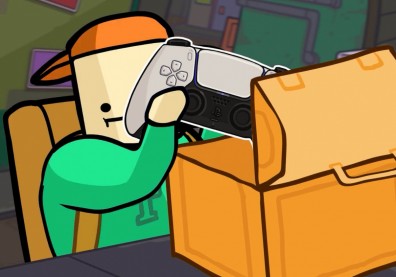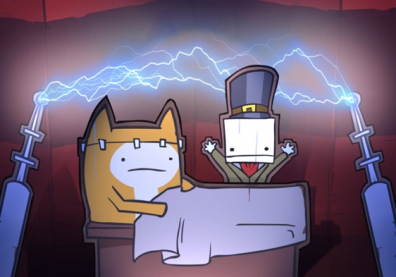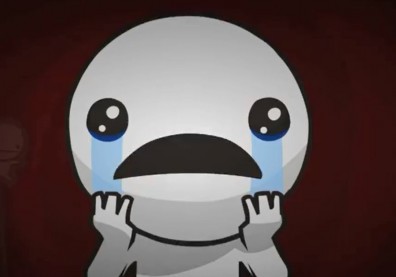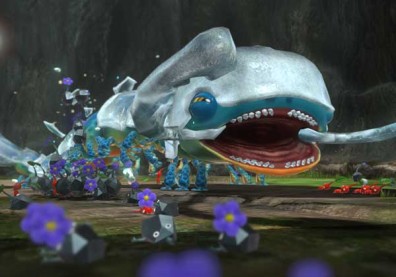There are two versions of "BattleBlock Theater." The first is a platformer in the purest sense. You're dropped into individual stages, asked to traverse and explore to find the keys to the exit (gems, in this case), utilizing checkpoints and a chosen weapon to make things easier. Everything is wrapped up in the endlessly unique and zany presentation developer The Behemoth is known for - Dan Paladin's hand-drawn universe has never been more compelling - but once the initial excitement wears off it all starts feeling a bit slow, a bit derivative.
This is "BattleBlock Theater" when you're playing by yourself. This is not the "BattleBlock Theater" that's meant to be played.
Throw a friend in the mix and everything changes, The Behemoth's vision for co-operative platforming blooms into view with every element of the game, from the story levels to the competitive arena and even the robust level-editor. It's all been miraculously balanced and designed to create the perfect cooperative atmosphere, and everything feels faster and more exciting as a result. A couple issues here and there aside, time at "BattleBlock Theater" is the best place to spend with a platforming friend.
Nailed that rhyme.
As I mentioned before, your simple task in each stage is to find gems (at least three) to unlock the exit and move onto the next stage. This simplicity is mirrored in each level's presentation. You and your buddy are going to learn how to navigate and manipulate every kind of environmental twist The Behemoth throws at you. It's in doing it together, finding ways to make each challenge a little easier with cooperation, and subsequently chucking your partner around the stage like a javelin that makes the experience so unique.
And then you might chuck him or her into a deadly pool of water, just for fun. Unlike, say, "New Super Mario Bros.," where griefing your supposedly cooperative partner often turned into a frustrating bout of counter attacks, the highly-forgiving and frequent checkpoints and lightning-fast respawn system in "BattleBlock Theater" makes death almost inconsequential, therefore a great side-activity to your platforming adventures. Flip a switch and drop your buddy into a pit of spikes, no worse for wear. Retaliation is bound to come but it's all in good fun. All the while your dynamic duo is learning the ropes, climbing the raising difficulty and creating the necessary rapport to tackle tougher challenges down the road. It all moves along at such a quick pace, amidst the betrayal and the successes and glorious laughter, you'll be halfway through the initial play through before your first night is over.
But worry not, for at a mere $15, "BattleBlock Theater" is brimming with stuff to do. There are effectively four campaigns - the solo and cooperative each with a harder difficulty that speeds up the tempo of a level. While the cooperative and solo versions of any given level look initially similar, small tweaks are made to require two players to get through the former. A platform is raised an extra level, a gap is widened, or maybe the switch configuration is changed up. Either way, the two experiences, playing alone and playing together, are so jarringly different that it doesn't feel like a waste of time doing either. Of course, that's factoring in that playing alone just isn't nearly as fun. It's more of a serviceable waste of time when you need it.
But back to the good stuff. Everything about the game's presentation seeks to maintain a light-hearted atmosphere, furthering The Behemoth's success in creative a truly enjoyable, truly cooperative experience. Nothing speaks more to this point than the narrator.
When "Bastion" released on XBLA I didn't think we'd be hearing from a more compelling and creative narrator for a long time. I was so wrong. So, so wrong. Where "Bastion's" voice was solemn and a little sarcastic, the voice running you through the "BattleBlock Theater" story is just completely insane, wonderfully so. His machine-gun delivery and constantly-sprouting tangential ramblings are only fitting considering the actual events that take place. You and hundreds of your friends go on a joyous boat trip only to be stranded on an island after a horrible storm. This island is run by cats. These cats throw you into a gladiatorial style gameshow for the fun of it. That's basically it. There are glowing hats, death-by-poop and a lot of butt cheeks along the way. In other words, The Behemoth is more confident than ever.
Players can customize their look by buying new "prisoners" with collected gems. The number of prisoners is initially staggering, and you can even trade with players online, but the system takes a back seat to the pure platforming gameplay. You'll find a guy you like and probably stick with it for a while. You can also purchase new weapons with collectable balls of yarn, but seeing as combat only really exists as an element to the platforming, these weapons have very little effect on the outcome of a story mission, plus you've likely bought every weapon by about halfway through the story.
But they do matter at the arena, very much so. Two teams of two can compete online in eight different arena modes. They vary from the simple King of the Hill to the extreme Capture The Horse and basketball-inspired Ball Game. There's actually a fair bit of strategy in choosing complementary weapons with your teammate, given the game mode and the arena you're playing in. The more brawler-focused Muckle and Soul Snatcher modes didn't particularly light my fancy, but they're good for a bit of nonsensical smackdown. Other, less directly competitive modes were passable, but didn't offer too much more than a normal cooperative game would have.
And finally, on top of all that, is a level-editor as open and accessible as I've ever seen. Considering the relatively simple layout of the story stages - every piece is effectively a "block" placed on a floating grid - this couldn't have been too hard to do., but it's wonderful that The Behemoth did it. As a matter of fact, it may simply be the level-editor The Behemoth used to create the story levels, albeit with a few user-friendly interface tweaks. Intelligently using the triggers as access points to block types and stage alterations, navigating the system is quite easy. It would have been nice to have some sort of label next to each block type, but that's only a minor bump in the road to your very own "BattleBlock Theater" level, which you can share online as you please. My first venture into the level-editor was a Ball Game arena specifically designed to prevent dunking. It took me all of fifteen minutes to get the basics down.
As for designing normal, gem-collecting levels. The more you play the story the easier it's going to get to use these blocks to their fullest and make the jump to your own innovations within the system. So long as the player-base keeps up, sharing levels and arenas, the level-editor may prove to be the best part about "BattleBlock Theater," but only time will tell.
As for right now, launch week, "BattleBlock Theater" is an amazing time, so long as you're playing it with a friend. Even jumping online with a stranger isn't so bad, as the left trigger activates a "help" cry and using other actions to communicate becomes a fun little meta-game on its own. The atmosphere of it all, from the off-his-rocker narrator to the endlessly charming and fantastic visuals and music, alleviates any potential moment for frustration. In a game where throwing your buddy to certain death, just for the fun of it, that's an achievement worth noting.
"Battleblock Theater" is available for Microsoft's Xbox 360 for 1200 points.









